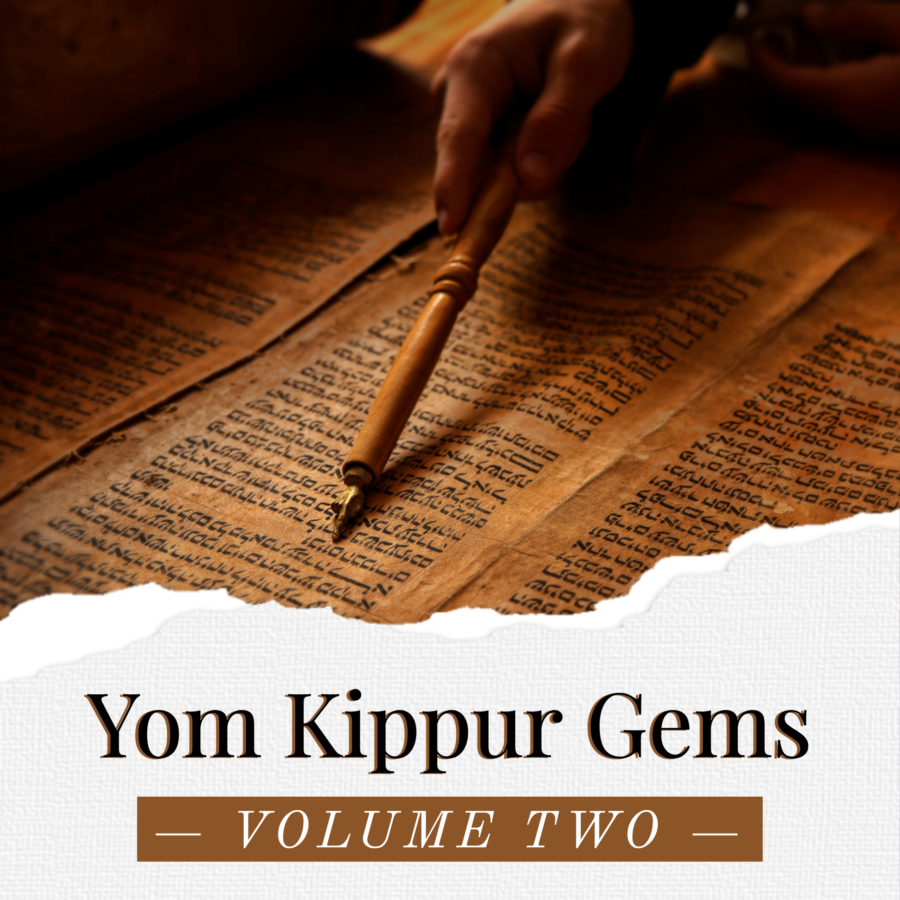
Recommended Price $60.00
Yom Kippur Gems Volume Two - 14 pages of Prayer Insights
These Yom Kippur Gems are filled with new, inspiring material that explain and elucidate many of the prayers we say on this holiday. They are intended to both entertain and educate the audience between prayers. They are rich with Jewish wisdom, wit and joy, and will help bring greater meaning to both committed Jews and casual congregants. Below is a synopsis of the Gems.
The Evening Service
The Heavenly Potter (p.66)
A famous writer once said, “The only person who really knows me is my tailor. When I go to get a new suit, he takes my measurements anew each time. Maybe I changed since I was there last.” Indeed this prayer, As clay in the hands of the potter, teaches us that we can always take our own spiritual measurements and reshape parts of our character that need adjustment. We shall see how.
Why Must We Beat Our Heart Over and Over Again? (pp. 71-76)
During the confessional prayer of Yom Kippur the custom is we beat our heart over and over again with our right fist, while confessing our sins. But why do we beat our heart like this? Is it self-punishment? Is it an attempt to keep ourselves awake through a long day, similar to the act of slapping one’s own face? Or is there something deeper going on? An Israeli expert on leadership, a rebellious Jew, and a Chassidic Master join to give us a profoundly relevant answer.
It Is Not Enough to Repent(pp. 73-76)
I ran across a cartoon showing a parishioner talking to his priest in a confession box. The caption read: “Well, that’s enough about me, Father. What have you been up to lately?” Ten times during the Yom Kippur service, the Viddui or confession of sins is recited. But why is it necessary to confess verbally? Is it just lip service or is it meant to be a deeper experience? A husband and wife who fought for fifty years give us humorous insight into this query but the deep answer comes from the Rebbe's talk on teshuvah and the power of verbal confession.
The Morning Service
Let the Air Out (pp.164-167)
This poem “Imru Lelokim” composed of phrases from all parts of the Torah acclaims the majesty and awesome power of G-d. A story about an 18 wheeler that was making its way through Los Angeles helps us move through this prayer smoothly. It will also illustrate how we can avoid many gridlocks in our relationships.
Yom Kippur: A Day Like Purim (p. 174)
Gustav Mahler was one of the most talented composers of the late 19th Century. He was Jewish but had converted to Christianity so that he could be appointed conductor of the Vienna Opera. But in the end his escape from his Jewishness did not work. We will find out why and how this throws new light on the remarkably enigmatic statement in the Zohar, that Yom Ha-Kippurim is, “K-Purim” - “a day like Purim.”
Donald Trump Moment (p. 176)
Often we say we forgive but inside we nurture a grudge, and actually do not let go completely of our psychological wound. The Talmud, however, offers us a teaching that can help us obliterate our old resentments. In a strange way, this teaching is connected to Donald Trump’s most famous phrase.
Judge Your Actions, Not Motives (p. 181)
A simple line that could heal many wounds and profoundly enhance the quality of all our relationships can be found in this prayer: “For the sin which we have committed against You by the way we talk.” We will see how this can improve our relationships by focusing on another question: When we discover we have hurt someone’s feelings, what is our first reaction? Do we attempt to assuage our guilt, and wriggle out of an apology?
The Musaf Service
Three Rs of Repentance (p.238)
Maimonides says there are three key elements in teshuvah. We can call them the “Three Rs” of repentance. The first is Remorse: The person must feel sincere remorse for his sin. The second step is Rejection: To stop doing the wrong deed. The third is Resolve: a strong determination never to commit the sin again. Only when all three dimensions are in place will the full process of repentance occur. These three points are beautifully illustrated with a fascinating story that occurred during the Civil War, with President Lincoln.
The Neilah Service
Thirteen Attributes of G-d’s Mercy (p.365)
“G-d, G-d, merciful and gracious ” These words are at the heart of our prayers on Yom Kippur. Indeed, we recite them thirteen times during the climactic Neilah service. The Talmud asks why it is necessary to repeat G-d’s name? The Talmud’s answer is illuminated by a moving story of a courageous Jewish girl in Azerbaijan. This story and prayer reminds us: We must never despair of any one, at any time. The doors of teshuvah are always open. No matter how thoroughly one seems to have alienated himself from that divine investment in his own being, we must always have confidence in the sudden, miraculous rekindling of that ember of Jewishness within him. We must never concede the loss of any Jew from Judaism, how much more so if that Jew is us!